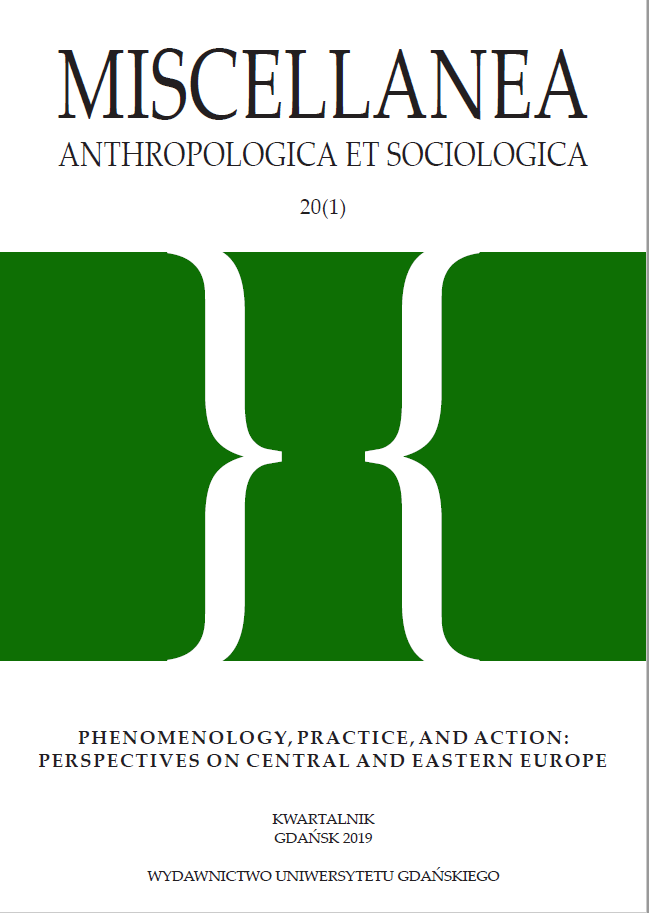The Rupture and The Rapture: Eternity in Jan Patočka and Krzysztof Michalski
DOI:
https://doi.org/10.26881/maes.2019.1.08Słowa kluczowe:
Eternity, time, Nietzsche, Patočka, MichalskiAbstrakt
The author interprets Michalski’s philosophical account of eternity presented in his last book on Nietzsche – The Flame of Eternity. An Interpretation of Nietzsche’s Thought. It is argued that in order to understand Michalski’s position one has to contextualize his philosophy, and refer to Heidegger’s and Patočka’s thought. The author tracks the way of how to understand the problem of eternity by reference to Ancient Greek philosophy, e.g., Anaximander. The thesis presented in the paper is that whereas for Patočka human temporality attains meaning through a movement of freedom in the rupture of eternity, for Michalski human temporality attains meaning through a movement of desire in the rapture of eternity.
Downloads
Bibliografia
Bataille G., 2015, On Nietzsche, transl. S. Kendall, Albany: SUNY Press.
Benveniste É., 1937, Expression indo-européenne de l’Éternité, Bulletin de la société linguistique de Paris, vol. 38, pp. 103–112.
Conche M. (ed.), 1991, Anaximandre. Fragments et témoignages, traduction, introduction met commentaires par M. Conche, Paris: PUF.
De Warren N., 2015, The Gift of Eternity, The New Year Book for Phenomenology and Phenomenological Philosophy, vol. 14, pp. 161–180.
De Warren N., 2016a, Augustine and Husserl on Time and Eternity, Quaestiones Disputatae, issue 7, no. 1. Special Issue on Husserl’s Phenomenological Time and Time-consciousness. De Warren N., 2016b, He Who Saw the Deep. Gilgamesh in Patočka’s Philosophy of History [in:] D. Meacham and F. Tava (eds.), Thinking after Europe: Jan Patočka and Politics, London: Rowman & Littlefield.
De Warren N., 2018, A Momentary Breathlessness in the Sadness of Time: On Krzysztof Michalski’s Nietzsche, Vilnius: Jonas ir Jakūbas.
Foucault M., 1989, The Order of Things, London: Routledge.
Heidegger M., 1975, The Anaximander Fragment [in:] M. Heidegger, Early Greek Thinking, transl. D.F. Krell and F. Capuzzi, New York: Harper & Row.
Heidegger M., 1980, Der Spruch des Anaximander [in:] M. Heidegger, Holzwege, Frankfurt: Vittorio Klostermann.
Heidegger M., 1992, The Concept of Time, transl. W. McNeill, Oxford: Basil Blackwell.
Kundera M., 2009, The Unbearable Lightness of Being, transl. M.H. Heim, New York: Harper Perennial.
Latta C., 2014, When the Eternal Can Be Met: The Bergsonian Theology of Time in the Works of C.S. Lewis, T.S. Eliot, and W.H. Auden, London: Wipf and Stock Publishers.
Michalski K., 2011, The Flame of Eternity. An Interpretation of Nietzsche’s Thought, transl. B. Paloff, Princeton: Princeton University Press.
Naddaf G., The Greek Concept of Nature, Albany: State University of New York Press.
Nietzsche F., 2008, Thus Spoke Zarathustra, transl. G. Parkes, Oxford: Oxford University Press.
Pascal B., 1991, Pensées, ed. P. Sellier, Paris: Bords.
Patočka J., 1985, Autour de la philosophie de la religion de Masaryk [in:] J. Patočka, La crise du sens, transl. E. Abrams, Brussels: Ousia.
Patočka J., 1990, Temps, éternité et temporalité dans l’oeuvre de Mácha [in:] J. Patočka, L’écrivain, son ‘objet’. Essais, trans. E. Abrams, Paris: P.O.L.
Patočka J., 1996, Heretical Essays in the Philosophy of History, transl. E. Kohák, Chicago-La Salle: Open Court.
Patočka J., 2002, Plato and Europe, transl. P. Lom, Stanford: Stanford University Press.
Patočka J., Michalski K., 2015, Letters Between Krzysztof Michalski and Jan Patočka (1973–1976), ed. N. de Warren, transl. N. de Warren, P. Eldridge and V. Tylzanowski, The New Yearbook for Phenomenology and Phenomenological Philosophy, vol. 14, pp. 223–269.
Steigler B., 2011, Nietzsche et la critique de la chair. Dionysos, Ariane, le Christ, Paris: PUF.
Strauss L., 1957, What is Political Philosophy?, The Journal of Politics, vol. 19, no. 3, pp. 343–368.
Williams J., 2011, Gilles Deleuze’s Philosophy of Time: A Critical Introduction and Guide, Edinburgh: Edinburgh University Press.

 Uniwersyteckie Czasopisma Naukowe
Uniwersyteckie Czasopisma Naukowe




